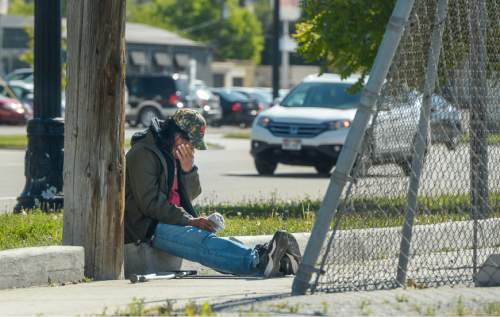This is an archived article that was published on sltrib.com in 2016, and information in the article may be outdated. It is provided only for personal research purposes and may not be reprinted.
How is this even possible?
The economy in this neck of the woods is up dramatically. Construction is booming. Unemployment is down. Utah is consistently ranked as being among the best places to do business.
Yet the most recent figures from people whose job it is to watch such things is that homelessness in Utah is up 7 percent in the last year overall, and has soared 17 percent among families.
This sad development is not in spite of all that other good economic news. It is, in many ways, because of it.
Without deliberate and extensive efforts to see to it that the bloom of the Utah economy reaches the people who need it most, homelessness is only going to get worse.
It should make it clear, once and for all, that a rising tide cannot be counted on to raise all boats. Some of those boats have holes in their hulls. Other people never even had a boat. So an economy that seems booming on paper can mean a bust for those who aren't at the right place at the right time.
The current Utah boom, like most economic successes, is tilted toward the top. Successful, or lucky, entrepreneurs. Businesses in the right niches. People with higher levels of education, particularly in such fields as information technology. Folks who can round up the financing to build yet another block of "market-rate" apartments.
Many others watch as all the really good job listings require qualifications they don't have. As rents remain out of reach for more and more people, even two-paycheck households, who don't have the skills that command more than the minimum wage. As families that were just getting by are pitched into bankruptcy — and onto the street — by an accident or illness.
It's not that state and local officials haven't tried. Money and brainpower, in the private and public sectors, have been devoted to the problem. An enlightened "housing-first" approach made a big dent in the number of people who were, by official definitions, "chronically" homeless, as well as in the number of homeless veterans.
And more help is on the way. Salt Lake County Mayor Ben McAdams and Salt Lake City Mayor Jackie Biskupski (like Mayor Ralph Becker before her) have given the issue considerable attention and political capital. The state is putting up more money for a new shelter and related programs.
It will take much more. It will take real Medicaid expansion, not the insulting crumb the Legislature finally passed. It will take a huge commitment to public education. It will take tireless efforts to expand the stock of affordable housing.
These numbers of Utah's homeless should put to rest, once and for all, the idea that all our leaders have to do is be friendly, and offer big tax breaks, to the wealthy and count on the economic benefits to trickle down.
Without deliberate efforts to make it otherwise, economic booms don't cure inequality. We must face that fact, and make the necessary efforts to curb that serious downside of growth.



